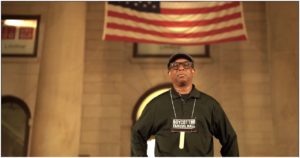Welcome back to World Brief, where we’re looking at U.S. President Donald Trump’s meeting with Chinese President Xi Jinping, the U.S. Defense Department potentially restarting nuclear testing, and deadly anti-government protests in Tanzania.
Trade Truce
U.S. President Donald Trump rounded off his six-day Asia trip on Thursday by reaching a framework trade agreement with Chinese President Xi Jinping in Busan, South Korea. Trump hailed the meeting as having been “truly great” and stressed that the U.S.-China relationship is “very, very important.” But the bigger winner out of Thursday’s talks appears to be Beijing, which used its near monopoly on rare earths and its purchasing power on U.S. soybeans to leverage trade wins from the White House.
Welcome back to World Brief, where we’re looking at U.S. President Donald Trump’s meeting with Chinese President Xi Jinping, the U.S. Defense Department potentially restarting nuclear testing, and deadly anti-government protests in Tanzania.
Sign up to receive World Brief in your inbox every weekday.
Sign up to receive World Brief in your inbox every weekday.
Sign Up
By submitting your email, you agree to the Privacy Policy and Terms of Use and to receive email correspondence from us. You may opt out at any time.
Enter your email
Sign Up
Loading…
Trade Truce
U.S. President Donald Trump rounded off his six-day Asia trip on Thursday by reaching a framework trade agreement with Chinese President Xi Jinping in Busan, South Korea. Trump hailed the meeting as having been “truly great” and stressed that the U.S.-China relationship is “very, very important.” But the bigger winner out of Thursday’s talks appears to be Beijing, which used its near monopoly on rare earths and its purchasing power on U.S. soybeans to leverage trade wins from the White House.
Under the framework agreement, China and the United States agreed to a one-year pause on further trade hostilities, addressing a 90-day tariff suspension that was set to expire next month. As part of the deal, Trump backed down on his threat from just two weeks ago to raise tariffs by an additional 100 percent and instead halved Washington’s 20 percent fentanyl-linked levy, bringing down total U.S. duties on most Chinese goods from 57 percent to 47 percent.
In exchange, Xi agreed to suspend rare-earth export controls announced on Oct. 9 for at least one year. China dominates global rare-earth supply chains, controlling around 85 percent of processing and 92 percent of magnet production, which are crucial to the U.S. military, semiconductor, and auto industries. However, as FP’s Rishi Iyengar, Keith Johnson, and Christina Lu report, the statement from China’s Ministry of Commerce about the agreement “did not address other critical mineral export controls that Beijing had issued prior to October—including ones on gallium and germanium, which are essential to semiconductors—and China still requires firms to secure export licenses for certain rare earths and magnets.”
China also agreed to resume buying American soybeans. Beijing was once the biggest foreign buyer of U.S. soybeans, but after Trump ignited his second-term trade war, Xi effectively froze all new orders—severely hurting American farmers. What Thursday’s deal has done is “highlighted for Beijing that this is a political pressure point that it can keep squeezing the United States on when it wants something done,” FP’s James Palmer writes.
Alongside rare earths and soybean sales, the trade framework outlines that China will begin purchasing U.S. liquified natural gas, particularly from Alaska, and both sides will suspend port fees that they imposed on each other earlier this month. Still, Iyengar, Johnson, and Lu note that “since U.S.-flagged cargo ships barely ply the seas and don’t much unload in Chinese ports, that was not a big concession on Beijing’s part.”
While much of Thursday’s talks centered on trade, Trump and Xi also discussed bilateral efforts to bolster collaboration to end the Russia-Ukraine war. Notably, though, talks did not center on Chinese purchases of Russian oil, which Trump has long demanded that Beijing end; China was the biggest buyer of Russian crude last year.
The two leaders also did not discuss Taiwan.
This was the first in-person meeting between Trump and Xi since the U.S. president’s first term six years ago. Trump on Thursday confirmed that he plans to travel to China in April and that Xi will visit the United States next year.
Today’s Most Read
What We’re Following
Nuclear tests. Trump has instructed the Defense Department to begin testing its nuclear weapons on an “equal basis” to the testing done by other countries. “The United States has more Nuclear Weapons than any other country,” Trump wrote on Truth Social late Wednesday, naming Russia as second and China as “a distant third” but catching up. According to the Federation of American Scientists, though, Moscow actually has more of these weapons stockpiled than Washington does; the United States has around 5,225 nuclear warheads compared to Russia’s more than 5,500 nuclear warheads and China’s roughly 600 nuclear warheads, though Beijing is expected to have 1,500 nuclear warheads by 2035.
It is unclear whether Trump intends for the Defense Department to detonate nuclear warheads as part of these tests or if he just wants the Pentagon to ramp up testing of nuclear-capable missiles, which already occurs routinely. The United States hasn’t detonated a nuclear warhead since 1992, and it is has signed but not ratified the 1996 Comprehensive Nuclear Test Ban Treaty. If he means for the country to restart tests involving nuclear detonations, it would be a dramatic alteration of decades of U.S. nuclear policy at a time when tensions with Washington’s nuclear adversaries are growing—and could potentially fuel an arms race.
Just hours before Trump made his announcement, Russian President Vladimir Putin declared that Moscow had successfully tested a nuclear-powered drone that experts have called a superweapon. The drone, named Poseidon, is designed to cause a tsunami powerful enough to devastate a coastal city. It is unclear if Putin’s announcement prompted Trump’s statement.
Disputed presidential election. Hundreds of protesters took to the streets in Tanzania on Thursday for a second day of demonstrations over the country’s disputed presidential election. Marchers have denounced the exclusion of President Samia Suluhu Hassan’s two biggest challengers from the race as evidence of growing government repression. Tanzania’s electoral body announced on Thursday that Hassan has won 96.99 percent of the vote in eight out of 272 constituencies tallied so far.
In response to the protests, Tanzanian authorities have shut down internet access, imposed a curfew, and deployed the military—with local police on Thursday firing gunshots and tear gas to disperse the protesters. A diplomatic source told Reuters that at least 10 people have been killed in the city of Dar es Salaam so far. And foreign lawmakers and rights activists have condemned the results as “neither free nor fair.”
“After Hassan replaced President John Magufuli following his sudden death in March 2021, many analysts believed that her tenure would mark a break from his authoritarian regime,” Nosmot Gbadamosi wrote in FP’s Africa Brief this week. “But now, some analysts and critics consider Hassan to be worse than the autocrat she replaced.” Under Hassan’s rule, rights groups have documented brutal killings, arbitrary arrests, disappearances, torture, rape, and other restrictions on freedom.
Underperforming at the ballot box. The Netherlands’ far-right Party for Freedom (PVV) was hoping for a sweeping victory in Wednesday’s snap parliamentary elections. But initial results on Thursday showed that the PVV did not achieve the results it was looking for. Instead, the far-right party is projected to tie for first place with the center-left Democrats 66, which nearly tripled its seats to 26 in the lower house.
“We had hoped for a different outcome but we kept our backs straight,” PVV populist leader Geert Wilders posted on X. The PVV is projected to have lost 12 seats in the House of Representatives, partly due to some former PVV members defecting to the ultraconservative JA21 party.
Wilders withdrew the PVV from the previous governing coalition in June over his partners’ unwillingness to back his anti-refugee measures, collapsing the government and forcing a snap election. A tied first-place finish marks a major blow for Wilders, as it significantly lowers the likelihood that his party will be able to be in the next government after recent pledges from mainstream parties not to enter into a new coalition with the PVV.
Odds and Ends
French authorities have arrested five more suspects allegedly connected to this month’s infamous Louvre heist, which saw two burglars (with the help of two accomplices) steal more than $100 million worth of France’s crown jewels. At least one of the individuals arrested is believed to have been one of the thieves at the scene, with the other four being “people who may potentially inform us about the unfolding of these events,” Paris prosecutor Laure Beccuau said on Thursday. That brings the total number of people detained in connection to the heist to seven. The loot itself, however, remains in the wind.







